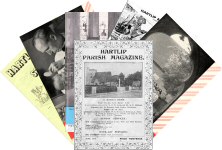
Hartlip Parish Magazine - on-line archive
July 1967 : page 6 (of 8)
loaned Him their boat. No service to God, however small, goes unrewarded. If we think of Him amidst "the common round and daily task" He thinks of us and gives His blessing unasked. So He commanded St. Peter to return to his fishing, and though he and his companions had toiled all night without success, yet now "a great multitude of fish filled their net". Truly God's generosity exceeds man's capacity. The practical application of every sermon must be renewed obedience and faith.
Prayer: Help us, O Lord, in all things to be faithful and obedient unto thee. Amen.
B.A.
A LOCAL HISTORIAN LOOKS AT HARTLIP - No. 11
The parish records of births, death and marriages, the administration of poor relief and church accounts gave glimpses of the village social life and conditions in the neighbourhood which formal records of property transfer never reveal. Hartlip was not without its "filius, populi" "populi ex matre" children with unknown fathers but this state of affairs is very common to all parish records. One such entry from Hartlip, "John filius, populi ex matre Joane Price' baptised 13th December 1612. Peoples' occupations, even the mundane, take on interest when they are over three hundred years old. On 2nd May 1614 Arthur Bennet carpenter married Joane Longs maydservant. Richard Moore of Gillingham, Blacksmith (probably employed in the Dockyard), married to Elizabeth Hardwine in 1613. Hartlip being so near the main London to Dover Road buried the known and unknown travellers who were found dead in the parish highways. On 22nd May 1618 was buried Richard Garder a stranger born at Littlebourne in East Kent.
Margaret wife of Thomas White the, Miller was buried five months later. By an act of Elizabeth I every parish had to support its own poor which it did by raising an assessment. It was always called a "cess of the poor". In 1662 the overseers of the poor raised a rate of 4d. per acre and spent it various ways. For example, - Item "paid for lodging Will Hastings one year £6 10s. 0d. Coat for Ann Hastings 7s. 4d. Item "for a payor of shoes for Hastings 1s. 10d." These and other items suggest that two young children Ann and William Hastings had been left orphans and the village rallied round and brought them up. No parish would allow, if it could help it, a person not born in the village to make a settlement there and so become a burden on the parish. People were pushed from one parish to another and often paid to get out of the parish. It was a game of musical chairs. No doubt this was behind the entry of 7th. July 1725 "For carrying Goody Seed. Settling warrant month's pay 18d. per week for removing her to Stockbury".
R.A.B.
ROUND THE SOCIETIES
Mothers' Union
Our year's programme ended with an outing to Brighton. A lovely sunny day made the lanes and villages of Kent and Sussex look at their best. A stop for coffee at Burwash at a cottage full of interest helped us on our way. Arriving in time for lunch at Brighton, we parked our minibus most advantageously on the front, from there to go wherever we wished - the Pavilion, the Chapel Royal, the shops or just a deck-chair by the sea.
A.G.